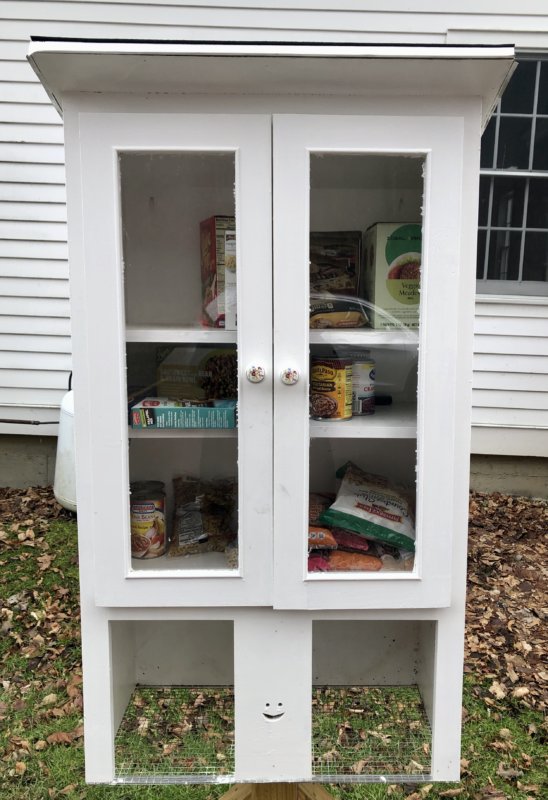Lots of options for food donations to Little Free Pantry
In two recent issues of The Charlotte News, Maj Eisinger and I wrote articles about the problem of food insecurity on behalf of Charlotte Food Shelf and Charlotte Grange respectively, because it is a heartbreaking problem in our community which goes mostly unnoticed.
Why is that? Is it so hard to imagine that here in Charlotte, where so many live so comfortably, there also live people who don’t? Is it too easy to assume that the churches and the food shelf take care of those needs?
Maybe.
Yes, we do have a social safety net, but sadly there are still people falling through it.

The Charlotte Little Free Pantry is behind the Charlotte Congregational Church.
In circumstances often way beyond their control, families and individuals can and do face food insecurity and inadequate nutrition. They can’t buy either enough food or food that meets nutritional needs. It can be a chronic problem carrying a constant worry and distress over how to care for oneself and loved ones today and then again tomorrow and again the next day. Imagine how awful that must be. Food insecurity can also strike those who are generally able to get by, until something unexpected throws off the budget and there is not enough left for food. That occasional food insecurity may last only until the next paycheck or a change in circumstances; or it may occur regularly at certain times of each month. That is also a terrible position to be in.
How can we change this? There are larger societal problems and public policy issues underlying food insecurity, and they are complicated. It will take time and concerted effort to change them. Meanwhile, federal and state government assistance programs do much to provide access to nutritious food, to those who apply and qualify (which isn’t everyone). Charlotte Food Shelf distributes significant amounts of food, again, to those who apply. Unfortunately, there are still those who fall through the safety net, and one important reason is being embarrassed to ask for help.
This is where a community’s direct action through a Little Free Pantry can be a game-changer. This modest cabinet is open all day every day, self-serve in a discrete location, with no paperwork or questions involved, stocked with mostly non-perishable food by those who are able and available free to those who need it — when they need it. Brilliant.
Charlotte Congregational Church created a Little Free Pantry last year in the parking area behind the building. Stocked mostly by community members whenever they can, food is going in and food is going out. This tells us at least two things: we have neighbors who need food, and we have a mechanism for neighbors who have enough food to share it. The Little Free Pantry provides direct and immediate food relief. Wonderful. This makes a difference.
So, problem fixed? No, not really. The Little Free Pantry is vulnerable to neglect; and without regular care, it does not function. Without a steady flow of food donations, there is not enough for those who come looking for help. The Congregational Church does accept checks marked in support of the Little Free Pantry, but its success is absolutely dependent on community members adding to the pantry on a regular basis, whether that is every week, every month, every other month, or whenever fits your schedule. Many people contributing regularly is what makes the system work.
Not sure what to put in the Little Free Pantry? Any non-perishable food, especially things high in protein like tuna, meat sticks and peanut butter, not past their “sell by” date, and securely sealed. (In winter, no cans or bottles since they might freeze and break.) Toilet paper and common toiletries, including feminine hygiene products, are also appreciated. Think about what kids might like to eat, what stressed adults might like to eat, how simple or complicated the preparation is, including for someone who might be living temporarily without a full kitchen or any kitchen at all. Avoid obviously unhealthy junk food but don’t forget that everybody likes a sweet treat once in a while. Vary what you bring or specialize in one thing you bring each time, like hot or cold cereal, protein bars, nuts, nut butters, dried fruit, fruit leathers, coffee, tea, boxed soups, broths, soy milk, pasta, rice, quinoa, lentils, split peas, beans, dehydrated fixings for a hearty soup or main dish, cornbread mix, crackers, popcorn, boxed pudding mixes, maybe cookies or chocolate.
Eventually, if a cooler can be added, more possibilities will open up. For now be thoughtful and creative, perhaps involve the whole family and become a regular provider of food to the Little Free Pantry for neighbors in need.
(Linda Hamilton lives in East Charlotte and is a member of Charlotte Grange.)

